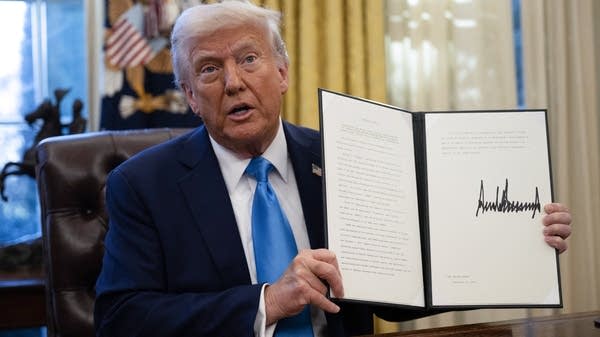How are businesses coping and preparing for Trump’s immigration policies?
There are many small businesses that are owned and operated by undocumented immigrants.

This story was produced by our colleagues at the BBC.
At her Staten Island bakery, Sarahi Marquez carefully places the finishing touches on her croissants. The 34-year-old came to the U.S. at age 6. Now, she runs this family restaurant alongside her father.
For her, the threat of deportation isn’t new — but it’s never felt this serious. “I still feel like I’m being persecuted, like I’m being hunted down,” she said.
It has taken on a new sense of urgency with President Donald Trump’s plans for mass deportation and has led to some tough conversations with her staff.
“I had a cook say to me, ‘I’m scared to go home because I don’t know if I will make it home,’” she said. “’I don’t know if I will be stopped along the way.’ I’ve seen business go down. There’s much fewer customers coming around.”
Trump’s promise to deport millions of undocumented immigrants is not just a threat to families and individuals — it’s also causing problems for local economies.
Particularly in big cities, many small businesses are owned and operated by undocumented immigrants. They and their local markets are already feeling a chilling effect from Trump’s threat.
Despite her family’s contributions to the local community, Marquez is worried about the future.
“I’m college-educated, a business owner of multiple businesses, I do right, I’m part of the community, but I’m still considered a criminal because of what? Of coming into the country as a child,” Marquez added. “And I don’t have a legal pathway to fix that.”
In the New York church St. John the Divine, a vigil was held to support migrants and promise sanctuary to the undocumented. On the very same day, the Department of Justice sued the city over its immigration policies.
For those caught up in Trump’s immigration crackdown, this isn’t just personal. It’s an economic tragedy for their communities who rely on their labor, their tax revenues and the money they spend in local businesses.
Jessie Lee manages Renaissance, a nonprofit that finances immigrant businesses. “Small businesses are the backbone of our economy,” she said.
I caught up with her in Queens where she was visiting one of her clients. She sees a difference from the last time Trump was in the White House.
“This fear is new,” Lee said. “We didn’t experience this the first time around, but this time we do see that type of concern.”
Raymond Lou runs a pest control company, M&M Environmental, which employs 70 people. He came to the U.S. legally from China and understands what motivates people to seek a life here.
“I would imagine everybody comes to the country — legal or illegal — we want to work hard and just do well, establish ourselves, right? That’s the American dream,” he said.







